
table of contents
- Apples
- Apricots
- Pears
- Cherries
- Mirabelle plums
- Peaches
- Plums
- Berry bushes as a high trunk
- Exotic fruit
- frequently asked Questions
Fruit trees in the bucket are a beautiful decoration for the balcony and terrace, which also provide delicious fruit. In addition to the classic types of fruit such as pears and apples, exotic species are increasingly taking over the balcony.
In a nutshell
- Apples and pears need a poorly growing base
- hardy columnar fruit benefits from winter protection in the first few years
- there are exotic column fruits, such as mulberries, which are hardy
Apples
"Braeburn"
- high vitamin C content
- juicy-sweet pulp
- low water requirement
- Pot size 60 - 80 cm
- Height: up to 250 cm
- Harvest: from October
"Gala"
- not self-fruiting
- suitable as a pollinator variety
- easy-care
- Table apple
- Pot size 60 - 70 cm
- Height: up to 250 cm
- Harvest: mid-September

"Golden Delicious"
- very productive
- sunny location
- Height: up to 300 cm
- Harvest: from September
Note: With column fruit for the terrace and balcony, always make sure that the trees have a weak base. The "Golden Delicious" variety is also available with half or High trunk whose fruit trees are not suitable for cultivation in a bucket.
Apricots
"Armi Col"
- narrow growth
- big fruits
- sweet taste
- not prone to Monilia
- Height: up to 250 cm
- Harvest: from July

"Compacta Super Compact"
- hardy to -25 ° C
- very productive
- very juicy
- not prone to Monilia
- self-fruiting
- Height up to 300 cm
- Harvest: July - August
Pears
"Conference"
- Pollinator variety
- needs a good water supply
- Height: up to 250 cm
- Harvest: from mid-September

"Doyenné du Comice"
- tender pulp
- green-yellow skin
- light fragrance
- low water requirement
- Height: up to 250 cm
- Harvest: from mid-October
Note: Pears are prone to different fungal diseases. As column fruit for the terrace, you should preferably choose resistant varieties.
Cherries
"Garden Bing"
- hardly forms side shoots
- self-fruiting
- robust
- Height: up to 200 cm
- Harvest: from August
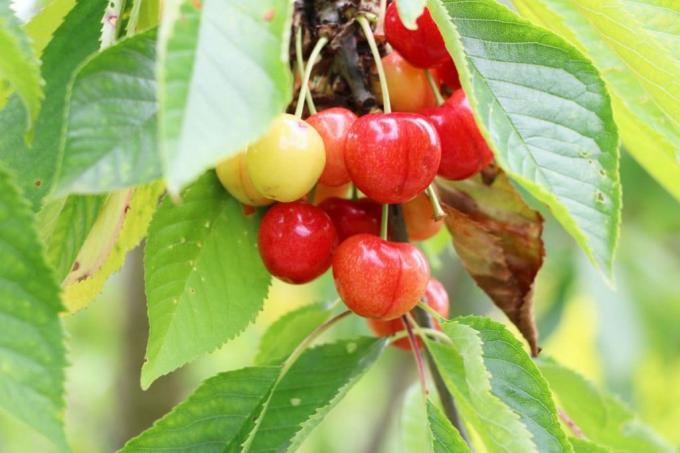
"Stella"
- robust
- aromatic fruits
- Pot size: 60 - 80 cm
- Height: up to 250 cm
- Harvest: late July - early August
"Swing"
- self-fruiting
- aromatic fruits
- easy-care
- very frost hardy
- Height: up to 400 cm, needs regular pruning
- Harvest: from mid-June
Mirabelle plums
"Bellamira"
- preferred sunny location
- robust
- self-fruiting
- high yield
- suitable for jam
- Height: 200 - 400 cm
- Harvest: August

"Nancy"
- self-fruiting
- very productive
- dissolves well from the stone
- prefers sunny locations
- very juicy and sweet
- Height: 200 - 400 cm
- Harvest: August - September
Peaches
"Bonanza"
- self-fruiting
- preferred sunny locations
- sweet and juicy fruits
- Height: up to 120 cm
- Harvest: from August

"PlatiforTWO"
- Plate peach
- white firm meat
- small stone
- intense red skin color
- Height: up to 300 cm
- Harvest: from July
Plums
"Anja"
- very resistant
- sweet fruits
- self-fruiting
- very productive
- Height: up to 250 cm
- Harvest: from mid-September
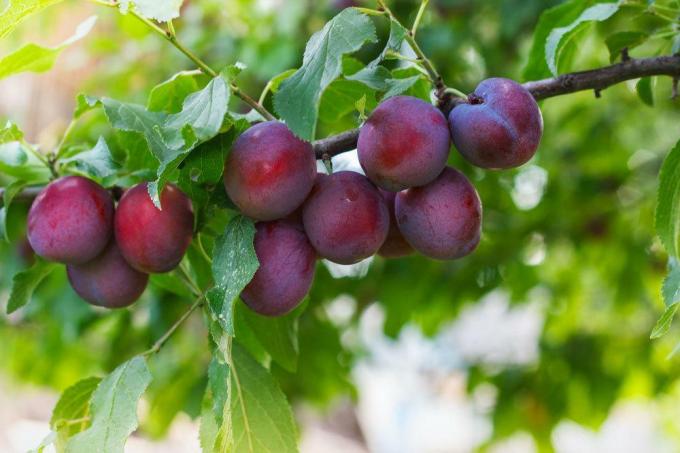
"Black Amber"
- self-fruiting
- very sweet taste
- sunny to partially shaded
- Pot size: 60 - 80 cm
- Height: up to 250 cm
- Harvest: September / October
"Colunar Ruby"
- sweet fruits
- reddish skin
- brings fruit in the second year
- self-fruiting
- Height: up to 250 cm
- Harvest: from the beginning of July
Berry bushes as a high trunk
Berry bushes with a high trunk can also be cultivated as small fruit trees in a tub.
Chokeberry "Aronia Viking"
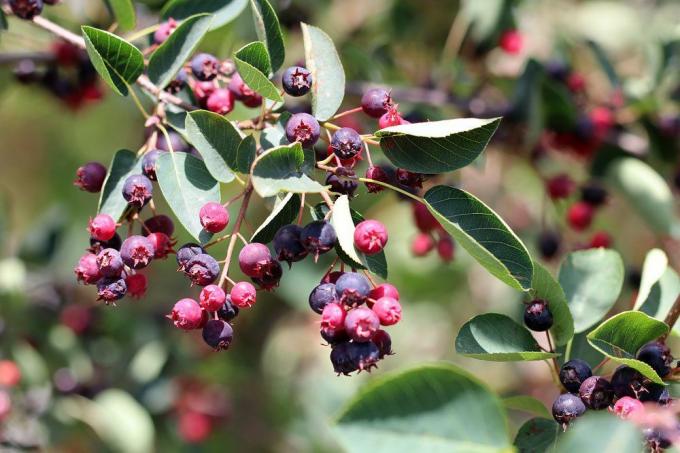
- high content of vitamin C.
- Berries can be used in many ways
- suitable for partial shade
- needs regular shape cuts
- Height: up to 150 cm
- Harvest: August
Gooseberry stems "Captivator"

- sunny to partially shaded location
- resilient
- dark red fruits
- eager to grow
- Height: up to 120 cm
- Harvest: from mid-June
Exotic fruit
With the right care, you can also grow exotic fruit trees in the tub on your balcony or terrace.
Figs
"Little Miss Figgy"
- attractive leaves
- drought resistant
- self-fruiting
- requires sheltered space
- Height: up to 90 cm
- Harvest: summer - autumn
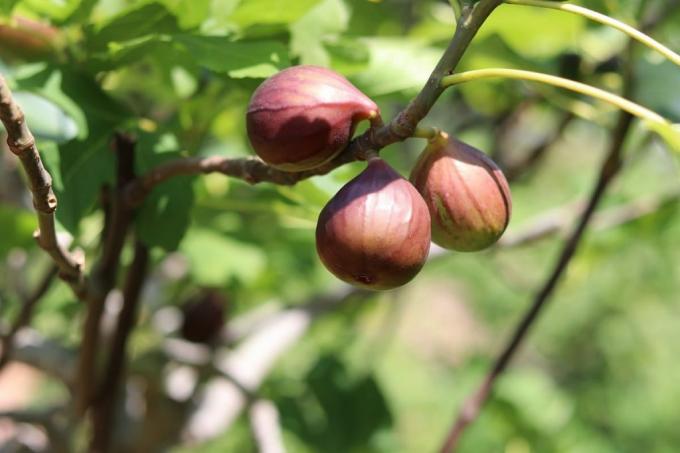
"Rouge de Bordeaux"
- not sensitive to frost
- very large fruits
- sunny to partially shaded location
- Height: up to 250 cm
- Harvest: end of July
Note: For the first two to three years, you should wrap the shoots of the fig trees well. They are not so sensitive to frost until around the fourth year.
pomegranate

- Hardy to -15 ° C
- vitamin-rich fruits
- Height: up to 150 cm
- Harvest: October
Note: All pomegranate trees are suitable for growing in a bucket.
Kumquat

- Fruits with their peel edible
- location in full sun
- not hardy
- Flowering from March
- Height: up to 150 cm
- Harvest: in autumn
Mulberry "BonBon Berry"

- hardy to -15 ° C
- bears fruit in the first year
- very sweet fruits
- New fruits are constantly ripening
- Height: up to 150 cm
- Harvest: May - September
olive

- two sapling necessary for fertilization
- sunny and warm location
- can withstand short-term temperatures down to -8 ° C
- low maintenance
- Height: up to 150 cm
- Harvest: from November
orange
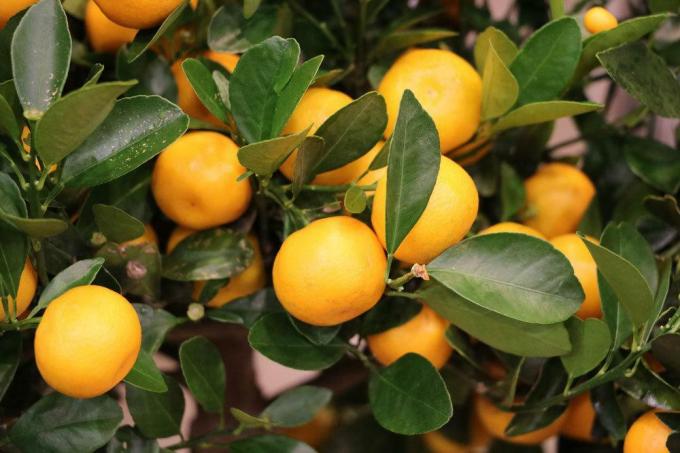
- not hardy
- must be wintered frost-free
- intensely fragrant flowers
- flowers almost all year round
- pour moderately
- fertilize regularly
- Height: up to 100m cm
- Harvest: almost all year round
Column kiwi "Issai"

- very productive
- smooth edible peel
- protected location
- nutrient-rich soil
- Climbing aid required
- Height: up to 300 cm
- Harvest: from October
lemon
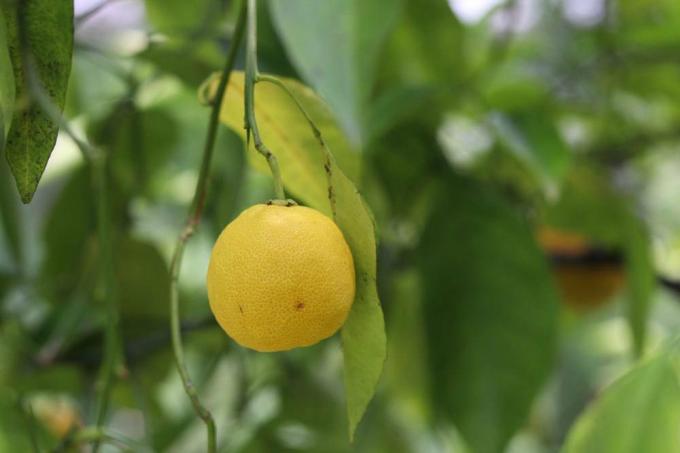
- not hardy
- Winter at 5 - 10 ° C
- medium maintenance effort
- medium water requirement
- flowers almost all year round
- Height: up to 300 cm
- Harvest: almost all year round
frequently asked Questions
Yes, there are column fruit on the market, on which pears and apples, for example, have been refined. Often, however, only one refinement develops so well that it also delivers yields. It is therefore advisable to limit yourself to only one type of refined fruit.
Classic fruits such as apples, pears or cherries tend to produce smaller yields in pots and are more suitable as dessert fruits that are eaten occasionally. However, high-stemmed berry bushes can certainly provide yields in larger quantities.
Yes, you should cut columnar fruit regularly. This keeps the fruit trees compact and they are more productive. Regular pruning also promotes the vitality of the plants.
As a base we use the tree species or - is the name of the variety on which the vines are grafted. It does not necessarily have to be the same species, because sometimes fruit trees are grafted onto wild bushes that have the desired properties. Low-growing rootstocks do not grow quickly and usually do not grow tall compared to strong-growing rootstocks.



